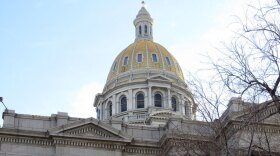Lawmakers in both parties have unveiled a proposal to bring a presidential primary back to Colorado. It's estimated that conducting a primary will cost anywhere from $5 to $7 million. Despite the price tag, the heads of both the state Democratic and Republican parties and Gov. John Hickenlooper support it.
We asked two reporters working at the capitol on a daily basis what that means.
Highlights From Capitol Conversation
Why People Want To Change From Caucuses To A Primary
Megan Schrader, Colorado Springs Gazette: "People felt like, especially on the Republican side where there was no presidential preference poll taken at all, that their voices weren't being heard."
Peter Marcus, The Durango Herald: "People were pissed off, and that's why the legislature needs to act now, they need to strike while the iron is hot. Because the bottom line is, is that there's always a financial situation with this, and with the bill they're proposing, they could actually not worry about the money for a few years, because the next presidential primary would be in a few years from now."
How A Presidential Primary Would Work
Marcus: "The way our caucus system works in Colorado now is you have to be affiliated with either the Republican or Democratic Party to participate. This will allow for a temporary affiliation, it's more of a preference; it's not an actual voter registration. That affiliation will go away after you voted for whatever ballot you chose a preference for, Republican or Democrat, and that way everybody can participate."
Schrader: "A caucus disenfranchises people who cannot be at their precinct at 7 p.m. on a Tuesday night. If it's a mail ballot you have weeks to get your ballot in, so more people would be able to have their voice heard in who the nominee is from Colorado. I think that everyone can get behind this. What is interesting is the caucus system is going to stay in place for state races, and county races, and local races."








